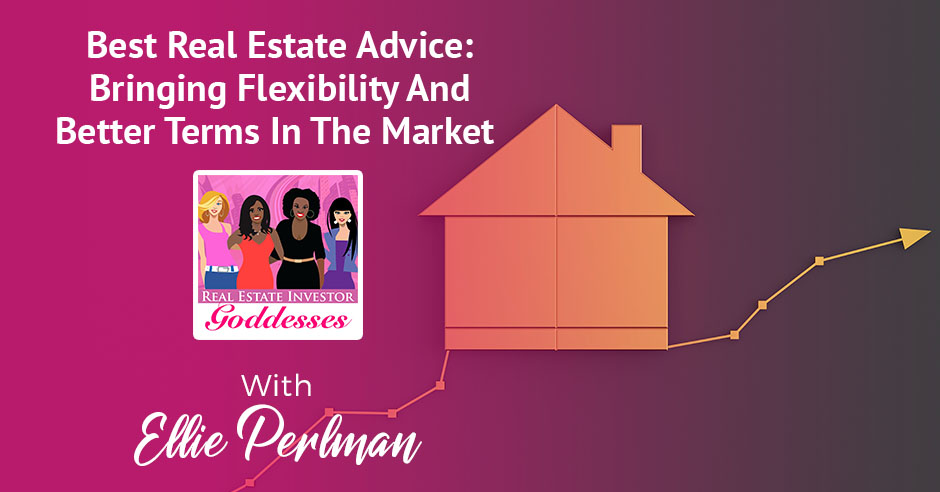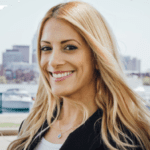
Investing is difficult. Not everyone can buckle down and close deals, and score clients. But investing is also lucrative, and you can slowly build your portfolio and increase your assets. Get the best real estate advice in this episode of the Real Estate Investor Goddesses Podcast, host Monick Halm sits down with CEO of Blue Lake Capital, Ellie Perlman, about her current real estate ventures and shares some useful investing strategies based on experience. Tune in and learn about this episode.
—
Watch the episode here
Listen to the podcast here
Best Real Estate Advice: Bringing Flexibility And Better Terms In The Market With Ellie Perlman
I interview badass, amazing real estate investor goddesses women that are crushing it in the real estate space. I’m so excited to have back Ellie Perlman, who I interviewed quite a few years ago and I was talking about her bio that I had from before. She was crushing it. She had come from Israel and in an underprivileged background to at the time owning $250 million worth of real estate. Now it’s over $700 million. She’s 3X-ed. It’s super impressive.
Ellie is a real estate investor who owns multifamily properties across the United States. She’s the Founder and CEO of Blue Lake Capital, a real estate investment firm specializing in multifamily acquisition and management. She helps investors grow their wealth by investing alongside her in large multifamily deals.
I’ve been very honored and excited to have partnered with her in several deals. I love her as a sponsor. She started her career as a commercial real estate lawyer leading real estate transactions for Israel’s largest real estate company. Later she transitioned to a property manager role and sold properties worth over $100 million. She holds a Master’s in Law and an MBA from MIT. She’s a Forbes author, she has her own podcast and in her spare time, she works out, drives sports cars, invests in startups and is now raising a beautiful baby daughter. I’m happy to have her. Welcome, Ellie.
Thank you, Monick. I’m excited to be here. We’ve partnered before. It’s always great to work with you and to buy real estate together. It’s been years since I was on your show. I haven’t been doing a lot of those, so that reminds me of how fun it is. I appreciate you having me.
I appreciate you being here and also being featured in the book. It’s a number one best seller. Grab your copy. Ellie’s wisdom is featured in that book and her story is super inspiring. She’s done a lot of amazing things. I want to ask her, though. I shared her bio, which is uber impressive. Ellie, can you share something with us that is not in your bio and most people don’t know about you?
I’m pretty much an open book. People know most a lot of what I’ve experienced and where I came from. It’s so out there. People know pretty much almost everything there is to know. Growing up in a household that I’ve been part of as a child shaped the way that I see the world and the way that I treat investors as well. People who came from nothing, it doesn’t matter how successful they’re going to be. There’s always that voice in their head saying, “You have to push forward. You have to keep going,” because they’ve tasted how it’s like not having the money, not being able to pay to buy even food or pay for your rent and had to borrow that money.
It’s not an experience that you’re ever forgetting. It’s the drive and the power that keeps you going. To your question, something that people don’t know about me, I don’t actually think that many people know that I’ve become became a mom. I was so busy with work that I was on a conference call 3.5 to 4 hours after I gave birth because things were going on. We still need to keep going. I actually never took a maternity leave. I’m like my toughest boss, apparently, so I don’t know if many people know that actually.
Four hours after you gave birth, you were on a conference call?
It doesn't matter how successful they're going to be. There will always be that voice saying that they have to push forward. Share on XYou can take the call from the hospital bed. I didn’t need to build a house or actually renovate and rip the carpet off. You can do it from laying in bed.
Giving birth is incredibly taxing and hard on the body. That’s intense. That’s wild. I found that you had a beautiful daughter, but I didn’t realize that you were on a conference call hours after giving birth. That’s next level. We might’ve already talked about that. When I had you on, your portfolio was about a third of the size. What are you investing in now, something that’s exciting you in terms of investing?
There are many different things that we’re doing. We’re actually working on a debt fund. We’re establishing a debt fund and I see the opportunity in the market. There’s a lot of borrowers that need reasonably priced loans. This is where we can step in because the alternative is not as great and the industry keeps rising. We feel it also how that impacts us. Every time there was a struggle or pain, I’m thinking not only how I could fix it, but how can I benefit from the situation?
Most, if not all, operators deal with increasing interest rates. This was also presenting an opportunity to say, “Maybe we can be the lenders and maybe we can bring a little bit more flexibility and slightly better terms so we can do more volume and then take advantage of the situation in a market right now so we can move quickly and invest in other avenues that involve debt.”
That’s something exciting and I have been working on. I’ve been hearing this question from my investors a lot. “What else do you have besides multifamily?” It’s great. It’s beautiful. We love the returns and the risk mitigation that investing in multifamily has, but we want to diversify. We want to invest in more asset classes and more vehicles.
A debt vehicle right now where we are in this stage of the economy would be the wisest thing to do. I’m thinking of all your eggs in one basket, but diversify, especially when there’s a short 60, 90 days window for liquidity. In any case, if you need it, you can take it out, but this is one of the most exciting things that I’m working on right now.
Would you be lending to multifamily investors, the borrowers that you’re focused on?
We would lend to basically either individuals or contractors and it’s basically a short-term kind of bridge debt. This is what we’re focused on.

Real Estate Advice: The right balance between seizing an opportunity and understanding the risk and calculating and understanding whether you’re comfortable with taking that risk, um, and others, um, some investors out there are much more aggressive.
As our economy is changing, your focus is on helping people with the lending as the lending terms get more stringent and money gets more expensive and harder to acquire. In this show, I’m focusing on advice because my book is Invest Like A Goddess: Advice From The Most Successful Women In Real Estate. What I heard there is something like a couple of nuggets that people could teach us. One is when challenges are presented, wherever there’s a challenge, there’s a solution that could be a business opportunity. I love that. It’s finding challenges and going, “Where’s the opportunity here to help others and to and to benefit?”
There is always an opportunity. When COVID hit and no one was buying real estate assets, that was an opportunity. That’s when we were willing to take risks in buying an asset that we bought a certain amount and then sold that a certain amount that was about $22 million to $25 million more. Less than eighteen months later, there was a pain, which meant that no one knew what was going to happen. A lot of investors did not want to take the risk, but that presented an opportunity.
As long as you’re willing to face the consequences, every opportunity has the potential for making a profit but also to not work as you want. As long as you’re willing to take that risk, then maybe 7 out of 10 times, you’ll be able to make a profit out of a situation that could be pretty scary to others. It’s always finding that fine that the right balance between seizing an opportunity, understanding the risk, and calculating and understanding whether you’re comfortable with taking that risk.
Some investors out there are much more aggressive than I am, so they’re willing, for instance, to buy 20% or 30% occupied assets, not basically forgo all cashflow for 6 to 8 months. During that time, they’re filling up the units. For me, personally, it doesn’t work right now because I like cashflow. Cash is king. I mainly need to revisit the statement, but I like to make calculated decisions based on calculated risks. I don’t like the risk factor to be very high. Being an attorney, it’s what sticks with you. Be aware of risks.
There are always risks. It’s just how you can mitigate it and how you can deal with it. What’s the best life advice you’ve ever received?
The best life advice that I’ve ever received was to never look back. Don’t waste your time thinking about the past because you cannot change it. I do like to look at the past through a certain angle, which is taking notes, learning what went wrong, so it’s not going to happen again, but don’t look back at the past if it’s not beneficial in any way. That was sound advice and I’m still working on it. For the most part, I never looked back and said, “I could’ve, should’ve, would’ve.” You’re basically wasting time that you could have focusing on how to improve the feature and make it better for you. It’s time wasted. Don’t waste it on something you cannot change.
You can change your future and present and focus on that rather than looking either back or to your sides and comparing yourself to others. Look back to how you used to be or a situation or an opportunity that they didn’t seize. It could be soul-crushing and time-consuming. If you’ve invested this time, building your future and working on the future, it’s just better for you and for the people around you. That was probably the best advice I’ve ever gotten.
Learn the lessons and accept the past and keep looking forward. What’s the best financial advice you’ve ever gotten?
You can change your future and present. Focus on that rather than looking back to compare yourself to others. Share on XThat’s a tough one because I don’t come from a family that guided me when it came to financial advice. I would probably say the advice that I got later was to never invest more than you’re willing to lose. Once you’re in that mindset, you say, “worst case scenario, I’m losing the principal. Can I still survive? Is anything fundamental going to change in my life?”
If the answer is no besides, “It’s going to be hard. I’m going to be disappointed and it’s not a desirable outcome,” when you have that mindset, then when things don’t work the way you want, you have the mental stability and stamina to move forward. Besides real estate, I invest as an angel investor and many companies just don’t work out and I lose the principal, but those that are successful more than compensate for all the other losses.
At the time of the loss, if I was mourning for every dollar that I lost, it would have made it impossible for me to be an angel investor. I’m always investing the amount that I’m comfortable losing, knowing at real estate, there’s not a very high likelihood for that to happen across the board, unlike venture capital, which is a bit different.
The amount of money or the percentage of your net worth that you’re willing to risk, the appetite for risk changes from one person to another. It’s based on your status in life, whether you have dependents or not, your personality, your background and the wealth that you’ve accumulated. As long as you have that certain number and are comfortable with that risk, you should do it.
What’s the worst advice you could give someone?
The worst advice would be don’t take debt. There’s a misconception among many people that you need to make enough money to be debt free. That is not necessarily a good thing. If you’re borrowing money to buy clothes and pay your credit card bills, that’s bad. If you’re borrowing money to leverage it and to buy assets and grow your wealth.
I know other people out there are against debt and there might be a mix between personal and business debt, but the worst advice anyone can give anyone else is to avoid the debt like the plague. Debt can be a wonderful thing if it’s done in a smart and conservative way. With increasing interest rates, obviously, debt is a bit different, but being debt free, it would not make any sense to buy multifamily. The numbers are very different if you put 100% of the money that you need from investor’s equity or if it’s out of pocket. Just be smart around debt, but don’t try and avoid it altogether because it’s hard to grow without it.
I know this probably in the Dave Ramsey school like, “No debt.” Don’t buy consumer goods like purses and shoes with debt. That’s silly, but borrowing at 5% for something making you 10%, 12%, is how you build wealth.

Real Estate Advice: Maybe they can be the lenders and bring a bit more flexibility and maybe slightly better terms so they can do more volume and then take advantage of the situation in the market right now.
He’s talking to a different audience. He’s talking to those who are underwater with personal debt and they can’t get a break.
You can send people from that school that buys real estate all cash because that’s what they’ve learned from Dave Ramsey. It’s like, “I’ll buy cash.”
You can’t grow when fear is what you see in front of you. When you picture it as dark, scary and negative, you try to avoid it like the plague. You should just be smart about it. Just look at the wealthiest people in the world. Give me one that is buying assets in cash. These guys have billions of dollars. None of them. They’ve all leveraged it. If you want to be successful, learn what the wealthy and the successful businessmen are doing. None of them are avoiding debt. I always like to look at those who succeeded in a certain arena. If I want to excel in that arena, I try to learn what they’re doing right. That’s one of the things that they’ve been doing right. They leveraged the right amount at the right time but did not avoid debt altogether.
It’s very hard to grow that way. It’s bad advice. Some very popular people give that advice and I agree. Who do you turn to for advice?
I like to chat with my husband about a lot of personal things. On the business side, the advice that I get is from books. I get a lot of inspiration. All the answers are actually there. I’m learning from people like Steve Schwarzman, people who’ve started huge companies and how they scaled those companies. Without knowing, they’re my mentors. Maybe one day I’ll have a conversation with them face to face, but these are the people I look for advice to.
I was thinking about hiring a business coach, but unless you started a company, took it to the next level, took it public and grew it to a household name company, you’re just a bit limited in how much you can help me if you haven’t done it before. If you’ve done it before, you’re not interested in talking to people who are growing their companies and scaling. I have several mentors that just don’t know that they’re my mentors. It could change one day.
What’s the book that you’re reading now?
I can read it in Steve Schwarzman’s book actually what it takes and it’s a great book. The opening scene is him and his partner, who has passed away since then, standing in Cambridge outside MIT waiting for the endowment committee. It started pouring rain and they realized that these guys had never showed up. They went home. This is a fascinating story. I keep picking the book. It’s on my coffee table. I pick it up once in a while and read different parts to remind myself how to do it. That’s one of the books that I’ve been reading. Also, Measure What Matters, a book I highly recommend for any business owner, focuses on what matters and how to get actual results.
Everyone can sound great on the phone, and the marketing materials are fantastic but pay attention to that little voice inside of you that is telling you, yes, this could be great. Share on XNot spread too thin because the first thing you do when you get up is to attempt to answer 5,000 emails and execute a lot of different tasks such as cleaning your to-do list and feeling good about yourself. Are they bringing you value? It’s very easy and tempting to do that. It’s one of my biggest things as well, but it’s not what’s going to take your business to the next level. What do you do? How do you measure what matters and execute a plan to help position you to extract the best value so you can take your company to the next level?
What’s the best advice you have for a woman investing in real estate and how did you learn this?
I had a mentor that actually knew that I was a mentee. I was looking for several mentors and interviewed a bunch of them. I realized that there was one of them that scaled quickly. This is the person that I knew could teach me how to scale quickly because I wanted to grow fast. That’s how I learned real estate. In addition to at MIT, I did my MBA degree and took classes at the real estate school there. That was another part of negotiating real estate that I’ve picked up and running models out of MIT. That’s how I learned about real estate and investing.
The best advice I can give women is to trust your gut. For men, women, aliens, babies and anyone who’s investing, trust your gut when it comes to investing with someone. If it doesn’t feel quite right when you’re talking with them, don’t do it. Everyone can sound great on the phone and the marketing materials are fantastic, but pay attention to that little voice inside of you that is telling you, “Yes, this could be great,” or, “I don’t know about this opportunity.” Listen to that voice.
Many women have a tendency to quiet that voice down and look at them more like, “These are emotions. Let’s put them aside.” Let that voice speak a little bit when you’re interacting with a sponsor that you are considering investing with. You think this guy or gal is great when you’re chatting with them. When things are not going to work as well, because it’s an investment and like any investment, there’s an inherent risk in it, do you trust these people to tell you the truth? Do you think they will be dedicated to managing the investment and your money in the best way possible? Listen to that little voice. It’s often accurate.
I’ve always listened to my gut. When I haven’t, I’ve lived to regret it. I’ve never regretted listening to it. I have regretted ignoring it. Before we go into our famed End of Show Trinity for brag, gratitude and desire, what’s the best way for people to connect with you if they want to find out more?
If you google my name, Ellie Perlman, you’re probably going see my website BlueLake-Capital.com. You can either google my name or go to my website, BlueLake-Capital.com. You can leave your information there and one of my team members is going to see the form and we’ll reach out to you. It’s under Invest With Us. You can read my story about our track record, the portfolios and our investment strategy. There’s the Invest With Us tab where you can add your information in. That’s the best way to connect with me.
Now it’s time for the Trinity. It’s a brag, gratitude and desire. What’s one thing you’re celebrating right now? What is your brag?

Real Estate Advice: Let that voice speak a little when interacting with a sponsor you are considering investing with.
One of the assets that we’ve exited when we were willing to take their risks and had investors trust in us. We purchased the asset during the beginning of the pandemic. We basically exited the asset at over 40% IRR in less than half the time. It was after 18 or 20 months since the purchase. This was always a great opportunity for investors are going to celebrate with us. That’s one of my biggest brags, that we were able to perform, even if it was a little bit scary at first. When we put the deal under contract, we didn’t know what would happen if investors would be interested in the deal. It turned out to be much better than we expected.
What is one thing that you’re grateful for?
I’m grateful for my investors. It’s phenomenal that investors trust me with their money, their children’s money and they’re willing to reinvest over and over again. It can get better than this when someone is actually trusting you with one of the things that they worked so hard for. One thing that I keep every time we exit a deal, and we’ve exited several deals to date, is always a feeling of gratitude towards investors because I wouldn’t be able to do what I’m doing without them.
Last but not least, what’s one desire?
One desire is to take the company and make it a billion-dollar company, make it a big company. That’s what I’m working on right now.
You are so close. I know you’re getting there. So shall your desire be or so much better than you can imagine. Thank you so much. It’s awesome always to talk with you and get your wisdom and plans. Congrats on the baby.
Thank you. It was great being here. Thank you for having me with me, Monick.
It was my pleasure. Thank you. Make sure you subscribe and join us next time for another interview.
Important Links
- Ellie Perlman – Past episode
- Blue Lake Capital
- Invest Like A Goddess: Advice From The Most Successful Women In Real Estate
- Measure What Matters
- Invest With Us
About Ellie Perlman
 Ellie Perlman is a real estate investor who owns multifamily properties across the U.S. Ellie is the Founder and CEO of Blue Lake Capital, a real estate investing firm specializing in multifamily acquisition and management. At Blue Lake Capital, Ellie helps investors grow their wealth by investing alongside her in large multifamily deals.
Ellie Perlman is a real estate investor who owns multifamily properties across the U.S. Ellie is the Founder and CEO of Blue Lake Capital, a real estate investing firm specializing in multifamily acquisition and management. At Blue Lake Capital, Ellie helps investors grow their wealth by investing alongside her in large multifamily deals.
Ellie started her career as a commercial real estate lawyer, leading real estate transactions for Israel’s largest real estate company. Later, she transitioned to a property manager role and oversaw properties worth over $100MM.
Ellie holds Masters in Law and an MBA from MIT Sloan School of Management. She is a Forbes author and a real estate investing podcast host.
In her spare time, Ellie enjoys working out, driving sports cars, skiing black diamonds, and investing in startups.
Love the show? Subscribe, rate, review, and share!
Join the Real Estate Investor Goddesses Community today:
- RealEstateInvestorGoddesses.com
- Real Estate Investor Goddesses Facebook
- Real Estate Investor Goddesses Instagram
- Real Estate Investor Goddesses Twitter





